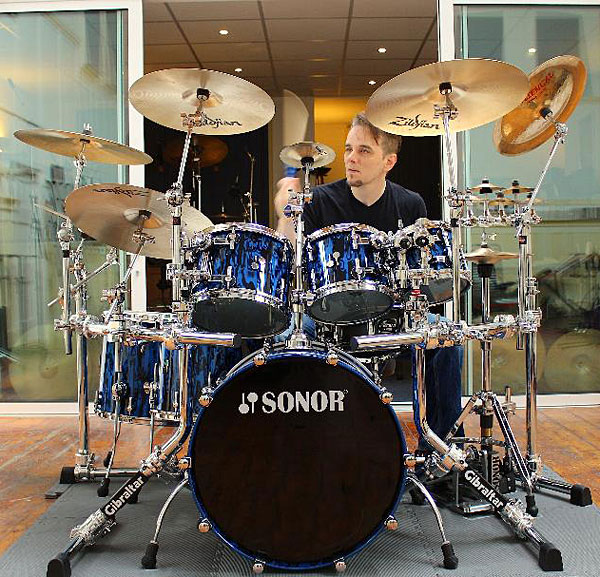Mike, I really appreciate your interviews, and as a drummer, certainly appreciate choosing Gavin as a subject!
Gavin Harrison Exposes the Secrets of His Expert Rhythmic Designs Page 2
Harrison: (slight pause) I don't really like that album very much out of the four albums I did with the band, but, yeah, it was a concept. I didn't think it had the same punch and catchy songs that the other, previous three had.
Mettler: Well, I guess it kind of went down its own path. After Porcupine Tree came to a close around 2010, you did work on some of Steven Wilson's solo projects. Do you guys still keep in contact, or talk about things at this point?
Harrison: Yeah! Yeah, I see him. He lives close to me. Pre-Covid times, we would meet up every once in a while and have lunch. He lives about 15 minutes from here.
Mettler: Since you've done surround mixing yourself, did you and Steven ever talk about any 5.1 technical angles, or compare notes on how you approach those mixes?

Harrison: No, not really. Not really. I'm sure Steve's got his own philosophy that he likes to follow with surround, but, what have I done—maybe three albums in surround? [Yep, namely: 2009's Circles, 2012's The Man Who Sold Himself, and 2015's Cheating the Polygraph.] Yeah, I enjoy doing it. It's very satisfying. It's just nice to have so much space, all of a sudden.
When you mix in stereo, you're always struggling for space. You're always thinking, "Well, now I can't hear this sound," or "I can't hear that sound." It's a very crowded picture, unless you deliberately write arrangements that have got lots of space in them.
It's only when there's space where you can actually hear the detail of the instrument. If you've got a beautiful grand piano and then you put a heavy rock band on top of it, it doesn't matter what sort of piano it was. It could be a [Yamaha] DX7 [synthesizer]—for how much you're going to hear it, it won't even matter.
If you're gonna use beautiful, acoustic instruments recorded in nice studios with nice rooms, then you've got to write music that allows that. I think a good example of that is the sound of John Bonham, and especially his bass drum. if you put a bass synth across Led Zeppelin, you wouldn't hear John Bonham's bass drum. The bass playing in Led Zeppelin facilitates the amount of bass drum to come through. With [Zep bassist] John Paul Jones playing high melodic lines, the bottom end is wide open, so you can hear that kind of drum sound. But you put that kind of drum sound in a song like, I don't know, [the title song] "Deadwing," you wouldn't even hear it.
Mettler: No, not at all. I'm just curious—even though I think I know the answer already—is there one particular Zeppelin Bonham moment that's the perfect encapsulation of that for you, like you just described?
Harrison: Well, "When the Levee Breaks" [the pivotal final track on Led Zeppelin's untitled November 1971 album commonly referred to as Led Zeppelin IV]. It's so empty. There's so much space. Not only can you hear the drums, you can hear the repeat echo on the drums.
Mettler: Oh yeah. It's so well done in that cathedral—or rather, in the hallway of that expansive recording location they were at called Headley Grange [located in Hampshire, England].
Harrison: Yeah, it was done in a hallway of a manor house. With sound, you've got to understand that with everything you put on top—you could have the greatest drum sound in the world, and then, as you gradually add more and more things on top of it, it's a compromise. The drum sound is going to get worse and worse and worse, the more things you put on top.
Sometimes, guitarists have the habit of multi-tracking distorted guitar, and distorted guitar is almost a frequency death sentence. If you put distorted guitar on something, it fills up nearly every frequency, from the bottom to the top. It really clouds the whole picture. There have been habits of artists double-tracking the guitar, panning it left and right, and then quadruple-tracking it. I mean, there's just no room for anything, once all that's going on. Sometimes it's so loud and so full, you can't even tell if there's drums actually playing!
Mettler: Is that more like the guitarist-as-producer, as in a "my name's on the marquee" kind of mentality, "so I need to take up more of the dynamic range"?
Harrison: Yeah. Some of it's ego-driven, sure. It's hard to know. If, say, you're a guitarist and it's your solo album, you think your guitar should be the most prominent thing in the mix. And, as I said, distorted guitar is not really an acoustic instrument. It's sort of, what would you call it? Manufactured sound. It's a very unnatural sound. I mean, if you talk to Robert Fripp about distorted guitar, it really starts with people slashing the actual cardboard cones in the amp, because they like the fuzz sound they made.

Mettler: That's like the Dave Davies thing, right? It was one of the first, innovative things he did with The Kinks for "You Really Got Me," when he took a razorblade and cut the speaker cone when he was playing guitar for that song in the studio in 1964.
Harrison: That's right, to get that distorted tone. And, you know, distortion is exciting. It makes the listener feel that it's so loud. Well, the media it's being captured on can't actually handle it. It's so powerful. The media—be it vinyl, or tape, or whatever—can't even hold it back. It does give you a sense of overdriven power, but it's a very hard thing to mix because it's an unnatural sound.
It's like mixing synthesizers. Synthesizes are making sounds that are not sounds of an acoustic instrument. And it's quite hard to mix bass synth. That's something you've got to be very careful with—otherwise, you're just going to eat up all the bass frequencies.
Mettler: That's gotta be frustrating, especially if you're the producer/mixer, and sometimes you probably hear that stereo playback and you're like, "I'm not getting the full sense of what I thought we had recorded here. We're missing something."
Harrison: Yeah, but I think you've got to go way before the point of the mix. You've got to be careful with the arrangement. You've got to know, very early on, what it's going to sound like. When I do a drum session at home, the first thing I'll do is just record 16 bars of drums, and then start mixing those 16 bars of drums in with the music I have to play to, because I need to know if it's gonna fit, how it's gonna fit, if I need to change something in the drums, if I need a different ride cymbal, and will I need a different snare drum? I need to know how the mix is going to be before I've even started drumming, to be honest—otherwise, I could spend a couple of days composing drum parts that don't work, and the sound doesn't fit.
Mettler: Have you had to turn down projects because somebody in the other chair said, "I want it to be this way," and you push back on that and say, "No, it's gotta be this way"?
Harrison: Well, mostly, when jobs or albums become offered to me, I always say to the person, "Let me hear the stuff first, because if I'm not feeling it, or if I don't think I can make a good, meaningful contribution to the music, it's pointless even talking about deadlines or budget." There's no point. If it's not going to work for me, or if I just don't like the style of the music or I don't like certain elements of it, then I just turn it down. And I turn down a lot more than I accept.
Mettler: Was there anything that surprised you—as in, you had a notion before you heard something and the artist surprised you, and you were like, "Oh yeah, I definitely want to work with this person"?
Harrison: I don't really judge the artists before I get to hear the music. It could even be, you know, a new Britney Spears album, or someone like that! Send me the songs, because it could be amazing! It could be a totally new angle for her to where I could think, "Oh, do you know what? This is actually really, really good."
There's some pop stuff I've heard that I like, like Dua Lipa. It's the last thing in the world you would imagine a drummer like me would be interested in—but if the music's good and the arrangements are good and I can hear some inspiration in it, the actual style or genre of it doesn't bother me at all. This could be, you know, Dolly Parton's new album. If I think it's really good stuff, I'll be happy to play on it.
Mettler: Ok, then let's call Ariana Grande's people and see what comes about. Actually, Billie Eilish and you would make an interesting team, I think. I'd love to hear what you would do on a Billie Eilish-type track. Now, that would be something.
Harrison: Yeah—she's really good! I've heard some amazing things. You know, there have been some amazing pop songs out there. Britney Spears' "Toxic" [a Top 10 hit single from her November 2003 album, In the Zone] I thought was a fantastic song. It's a really, really good pop song. You might be sort of prejudiced to think, "Oh man, I'm not gonna listen to Britney Spears—you're joking! Or Miley Cyrus—I'm not gonna listen to that!" But actually, you might be surprised to think, "This is actually a really good song."
Mettler: There's nothing wrong about liking good pop songs, and it doesn't matter who sings them. Well, to swing the wrecking ball, so to speak, back to what I'll call your "regular" universe—you played on your King Crimson bandmate Jakko Jakszyk's new album, Secrets & Lies, which he and I talked about recently. How did he approach you about working on that? As I understand it, some of those songs came out of actual King Crimson recording sessions.
Harrison: At the start of a King Crimson musical year, there are some songs that are presented as possible new songs, and "Uncertain Times" was one of those things I played on that wound up on Jakko's album. I think I even overdubbed some other drums on it, imagining it might end up being played by the three drummers in King Crimson [i.e., Harrison, Jeremy Stacey, and Pat Mastelotto]. For one reason or another, it didn't happen with King Crimson—but Jakko released it, and used the stuff I'd written for the three drummers.

Mettler: I got to see the 50th anniversary show King Crimson did at Budweiser Stage in Toronto on September 14, 2019, and it was a pretty exciting, heady show. Hopefully, the tour will continue after the pandemic passes, but how did that part of the 50th anniversary tour go for you as a performer?
Harrison: It was great! As a band, we finally found our feet a couple of years ago. It was really an experiment in 2014. It was like, "Well, let's see if we can make this happen." We did a short tour, and we said, "Yeah, I think that worked—let's do another tour!" We started finding our feet in how this version of King Crimson could find its own path. It had to become more than the sum of the parts—and probably, in the beginning, it was the sum of the parts.
When we got to Mexico in about mid-2017, it was the end of a tour. We did five shows in Mexico City, and it really clicked. It's a weird thing. It's not something you can really quantify easily, but something just kind of clicked, and we all recognized we had all gone up a step, and things had finally come together in a really nice way.
Mettler: Is it fair to say that you, Pat, and Jeremy have to basically script out your parts, prior to even playing anything?

Harrison: Yeah. Oh yeah, big time. The drummers, we often rehearse a week or so before we get together with the band. We just go in a room and work out what we really have to play, and see if it works or not.
Mettler: How do you nail down that material? Does Robert [Fripp] give you a list of songs and say, "This is what I want to play this time around"? How does that come about?
Harrison: Yeah! He gives us a list of songs—and obviously, now having played for six years together, we've got about 50 songs. He'll just say, "Look, this next [touring] season, let's keep, these 25 [songs] going." Some of them will go on the subs bench [i.e., the "substitute tracks"]. We might occasionally bring out a song like "Fracture" [from March 1974's Starless and Bible Black], but we're certainly not going to play it every night. We might rehearse it and we might play it at soundcheck, and then not play it [during that night's show].
There's normally a core of about 10 or 15 songs we play every night, and then another 5 or 10 that we will move in and out, because quite often, we'll play two, three, or four nights in the same venue. We appreciate that people will come to two or more the shows, so we give them reason to want to come to more than one show, and we'll probably play a different set on the second and third night.
Mettler: Is there one song you could break down for me that you three drummers had to take pieces of and turn into your own thing, as an example of the process?
Harrison: Well, for better or worse, I get assigned the job as the drum arranger. And part of that was the fact that right in the very beginning, in 2014, Robert wanted me to do that. He knew I had the studio at home and he knew I was a bit of a rhythmic designer—and he knew I could come up with drum arrangements not really knowing the originals, because I wasn't a King Crimson fan.
Mettler: Which was something Robert liked, right—that you didn't grow up idolizing King Crimson at all?
Harrison: Right, I was the guy who didn't grow up having the albums. He said, "Look, forget the drums on all these songs. Just treat them as if they're new songs, and just write whatever you think is an interesting path for three drummers."
Nine times out of 10, of course, the original songs just had one drummer. A good example might be something like "Discipline" [the instrumental title track for KC's September 1981 "comeback" album]. I tried many different things, and you can't have three drummers all playing the same thing at the same time. It's very hard to have two drummers playing where the bass drums and snare drums are not fighting each other, so I carefully arranged the three drum parts for the song that is nothing like what Bill Bruford played originally on "Discipline." It's a very interesting song from a rhythmic point of view, in that one guitar is playing in 5, and the bass [played by Tony Levin] is playing in 17. You've got some nice possibilities.
With a song like "Moonchild" [from KC's October 1969 debut album, In the Court of the Crimson King], you don't have, nor do you want, that sort of polyrhythmic complexity. You've got to recognize when simplicity itself is actually the best way to go. You can't just try and jam three drums on top of everything. That doesn't work. There are certain songs and certain moments where it works, but you've got to be careful where and how much you use it.
Mettler: Have you ever brought a song up to Robert and say, "I'd like to play this"? Is that part of the process, or is that not something that can be done?
Harrison: There are times where Robert is always open to the suggestion, "Hey, why don't we do this song on the next tour?" There was a time quite early on, maybe 2015, or going back to 2012, 2013—there was talk of a version of King Crimson with myself, [guitarist/vocalist] Jakko Jakszyk, [saxophonist/flautist] Mel Collins, and [bassist/vocalist] John Wetton. And myself and Jakko started doing arrangements of things like "Red" and "One More Red Nightmare" [both from October 1974's Red, which featured the late, great Wetton as part of the band]. But that project never got off the floor, so that was gone.
When King Crimson started again, a couple of years in, I said to Robert, "Hey, you know what—a few years ago, me and Jakko tried arranging 'Red,' 'One More Red Nightmare,' and a couple of others." And he said, "Oh! Ok, great. Well, let's try that. Let's put that in the set for this new tour." It might've been 2016, 2017, or something, and we started playing those songs.
There are always numbers coming through that probably are going to be rearranged. There are "new" old songs, and sometimes there's new "new" songs, and there's nearly always a new drum piece I've written and arranged and rehearsed with Jeremy and Pat.
Mettler: Is it possible to call one of those songs a favorite, as in, "This is my favorite song in the Crimson canon to play"? Can you quantify anything like that?
Harrison: Well, there are some things that are very challenging. Doing a song like "Discipline" is very challenging. A song like "Fracture" is very challenging.
I don't really have favorites. You know, people ask me the same thing of Pineapple Thief or Porcupine Tree. I don't have favorites. Some songs I might enjoy more on some nights. It depends on the mood of the evening, and the way the crowd is. It's much more organic than, "Hey, that's my favorite."
- Log in or register to post comments
































































